Business
Georgia’s Labor Market and Resources to Help Companies Face Current Challenges
Published
3 years agoon
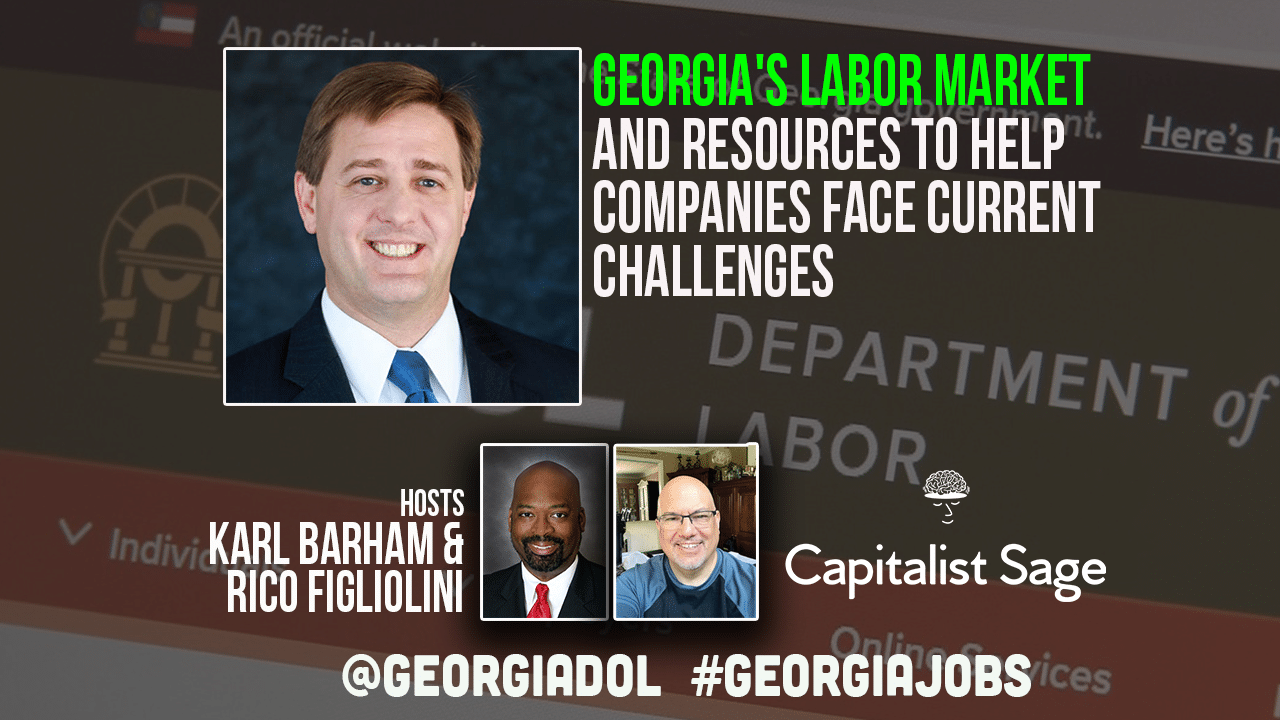
On today’s episode of The Capitalist Sage, Karl and Rico are joined by Georgia Commissioner of Labor, Mark Butler. The Department of Labor’s mission is to work with both public and private partners in building the workforce system that contributes to Georgia’s economic prosperity. Listen in to hear our hosts discuss what’s happening in the labor market here in Georgia, some of the trends that we see going forward, and some of the resources that are available for small and large business owners in finding great talent to help their businesses and organizations prosper. (Recorded before the recent Omicron outbreak.)
Resources:
Employ Georgia Website: https://employgeorgia.com
Georgia Department of Labor Website: https://dol.georgia.gov
Timestamp:
[00:00:30] – Intro
[00:02:30] – The Department of Labor’s Role
[00:06:19] – Working with a Small Pool of Workers
[00:10:45] – Business Owners Responses
[00:13:47] – Education Issues
[00:23:16] – Resources Available for Employees and Employers
[00:24:53] – What to Plan for in 2022
[00:33:14] – Closing
“There are actually a lot of opportunities out there for training that can work with even smaller businesses, especially with your technical colleges, that a lot of people don’t know about. And so I really strongly suggest, if you’re having certain types of needs, go talk to your local technical college. And they have specialists that can sit down and talk with you, see what kind of training they provide. And they can also provide you with a pipeline of talent for people who are coming into the technical college too. Some great recruiting grounds. We use them.”
MARK BUTLET
Podcast Transcript
[00:00:30] Karl: Welcome to the Capitalist Sage Podcast. We’re here to bring you advice and tips from seasoned pros and experts to help you improve your business. I’m Karl Barham with Transworld Business Advisors, and my co-host is Rico Figliolini with Mighty Rockets, Digital Marketing, and the publisher of the Peachtree Corners Magazine. How are you doing today, Rico?
[00:00:48] Rico: Great, thank you. Great to be here. This is going to be a good show. So I’m looking forward to it.
[00:00:54] Karl: Absolutely. Absolutely. Why don’t we start off by introducing our sponsor for today?
[00:00:59] Rico: Sure. This episode of the Capitalist Sage has been sponsored by Peachtree Corners Magazine, which also sponsors a family of podcasts, including Peachtree Corners Life. And you should check out also Prime Lunchtime with the City Manager. So all good stuff and great to have these opportunities to do these shows.
[00:01:16] Karl: Well today, it is my pleasure to introduce our guest. Commissioner Mark Butler. He is the Georgia Commissioner of Labor. The Department of Labor’s mission is to work with both public and private partners in building the workforce system that contributes to Georgia’s economic prosperity. Today we’d like to talk about a little bit about what’s happening in the labor market here in Georgia. Some of the trends that we see going forward. And most importantly, what are some of the resources that are available for small and large business owners in finding great talent to help their businesses and organizations prosper? How are you doing today, Commissioner Butler?
[00:01:56] Mark: Doing great. Thanks for having me on. And I like the pressure you’re putting on me saying it’s going to be a great show. We hope so. We try to make this interesting. A lot of times people hear that the Labor Commissioner is going to come speak and they’re like, oh gosh, that doesn’t sound very exciting. But I think workforce development is very exciting. And I think what we’re seeing right now in our economy. Is, it’s exciting, but it’s also scary at the same time. We’re seeing things that are happening right now in our economy that quite frankly just don’t make sense. There is just very strange things going on right now. And you really can’t depend on some of the old indicators to really tell you what’s going on in the economy because they just really are not relevant right now.
[00:02:30] Karl: I know a lot of small business owners especially feel alone out there. When I talk to business owners every day, they’re all looking for people. They’re cutting back hours, reducing services, and they’re starting to do that. Maybe you could share with us a little bit about the department of labor’s role in the Georgia infrastructure, when it comes to workforce development.
[00:02:50] Mark: Right. Well, we’re at right now, the department has been in a, kind of a mode of transition. Because you know, until about, say about six or seven months ago we were tasked by the federal government to roll out a bunch of new unemployment programs because of the pandemic. And so we basically had to go all hands on deck approach and shifted a lot of our personnel that used to work in Employment Services and Business Services. They had to come over to the unemployment side of the house because it was almost impossible to hire during the pandemic and add new people. So we had to use our own people that were doing different jobs. And so, we’re in a transition right now, putting those people back to work. Because one thing that we’re seeing right now even though we’re seeing jobs come back. Fairly quickly and also seeing employment. Right now, I think employment is within about 20,000 jobs statewide of being back to where it was before the pandemic. However, the number of individuals in the workforce is down greater than that. Now, I throw a lot of terms out there. And I want to say something for the people that are listening. Workforce, when you hear me say workforce that’s everybody who is working or actively seeking work. Okay. You may not be working, but you’re wanting to work. And then you have employment, obviously that’s, self-explanatory. Those folks are actually working. Now when I talk about jobs. I’m not necessarily talking about people working. I’m talking about total number of jobs. These could be also open jobs that haven’t been filled. And that’s really where the big emphasis is right now, as everybody who’s listening to this probably knows. And almost anybody that I’ve ever talked to that’s been around for more than say, 40 years can tell you that, they’ve never seen anything quite like this. You know, I’ve talked to veterans who’ve been here, almost 30 years. And they said, they’ve never seen the amount of job openings that we have right now that are going unfilled. And there’s a lot of things that have contributed to that. You know, one of the things that we were saying gosh, probably six or eight months ago, that was going to be a factor. And now we’re starting to see some studies come out to say, this is a factor. A lot of individuals who were either right at retirement or at retirement, or you know, maybe they’ve been working past retirement age have decided to leave the workforce. The pandemic has shifted the way somebody thinks about life and what they’re doing, has changed their priorities. And that baby boom generation that we’ve been kind of wondering what’s going to happen, you know, when all these baby boomers retire. That’s a big chunk of our workforce. What’s going to happen? You’re finding out right now what’s going to happen. And what’s happening is we have a ton of jobs sitting out there that need to be filled. And you’ll hear a lot of these reports come out from economist saying, you know, job growth is slow. Job growth right now is not where you gotta be looking. Right now, you’ve got to be looking at getting more people in the workforce and filling those jobs. Because, you know, if you’re like me and you came from the private sector you may want to hire a hundred people right now. But if you can only manage 10, that’s the only job that you’re filling. So if you can’t even get to the other ninety yet. And so one of the things, you’re not going to see tremendous job growth until we can start filling the ones that we have. You can’t create more until you fill the ones you have. But right now it’s a real struggle just because you don’t have a number of individuals who are out there looking. A matter of fact, we have actually fewer people unemployed right now than we had before the pandemic began. So a lot more people are working. And we, you know, we just broke our all time for unemployment rate on this past month down to 3.2%. Which, that’s extraordinarily low, especially for a state our size and a population as big as what we have. And there’s a very good chance we’re probably going to end up breaking that record yet again, because the job market and the labor pool is just getting tighter and tighter.
[00:06:19] Karl: So if I could ask, if I understand correctly, the number of people available. And I’ll say probably across the country, we’ll say here in Georgia, that are available to fill jobs have decreased. And some of it is baby boomers retiring. Some of these people are making personal choices to not work because of childcare or whatever, related issues. But we have a smaller pool of people to fulfill the jobs. The number of jobs have stayed at least relatively stable or they’re there. But right now the challenge for employers is finding those people and matching them to the jobs that fit their skills.
[00:06:57] Mark: Right. And if you take a look. I mean, the best estimates that the US Department of Labor when they do their surveys, the best estimates they have for Georgia anyway, we’re showing that right now we have probably about 40,000 fewer people in our workforce than we had say right before the pandemic started. So, you know, February 2020. Now I know that seems like forever ago, but go back and think about February of 2020. We had already just set a new, all time low unemployment record back then, which we’ve already broken now. And we already had a very tight labor market then. Now subtract 40,000 people out of that same pool. I mean, even in a state our size, that is a tremendous. And by the way, I think 40,000 is a low number. I think they’re missing it. I think that, when they go back and look at these numbers, I think that number is going to be far greater than that. Otherwise you wouldn’t see the issues we’re having because we weren’t having this kind of issues. Think about all the restaurants right now that are not able to open their dining rooms and they can only handle carry out and things like that. And then actually that kind of rolls over to all kinds of small businesses. It doesn’t matter what you’re doing. And that is contributing to our supply chain problems, which is also going to be contributing to inflation. Because right now, one of the side effects, which is good and bad, depending on what side of this equation you’re on. And I say it’s kind of a wash. Because there is such a tight labor pool. You know, the first thing everybody thinks of is, okay well, I’ve got to raise my wages. If a raise up my pay scale, then I’ll get those workers, right? And so they do that. Well, everybody else is having that same thought. And so they’re raising theirs up too. And so then what you have is, okay, now we’ve got to pay for these other pay raises because I’m not just paying that new worker more, but everybody who’s been here, a year, two years, five years, ten years, I’ve got to push them up too because that won’t be fair. So then, if you’ve ever run a business, you know 70 to 80% of your costs is going to be personnel in most cases. So now you’ve got, okay, I gotta pay for this. So what do you, do? You push up the price of goods. You push out the price of service. I mean, we just had a, I think report came out, you know, this morning where it showed that we just, I think set up a monthly record for increase inflation. I think it hit 6% this past month. That’s just crazy. But if you’ve been, you know, if you’re like me, I do the grocery shopping. And I can go ahead and tell you, I have a very good memory for prices cause I’m a bargain shopper. I like to get the best deal. And I had my daughter with me the day she was visiting from New York and she went to the grocery and I said, you see that pack of bacon right there? I said, I can remember about a year and a half ago that pack of bacon was $6. And here it is $11.99. You know, 12 bucks basically. That’s twice as much as I was getting for it. And I’m thinking we’re not buying that bag. I just can’t see myself giving that kind of money for bacon, but I probably will. But think about that. So let’s say you’re one of those individuals that got lucky and all of a sudden, you were maybe in a $9.50 or $10 an hour job, and now you’re making $15 an hour job. But your grocery bill has gone up 40%. Okay, so you didn’t actually get a raise, did you? I mean, all your costs for childcare, for gas. And look at gas. I mean gas is up a lot from where it was this time a year ago, you’ve got to get to work. And so all your costs have increased across the board. And so a lot of this stuff’s going to be a wash. And so right now we’re in that adjustment period. We’ve got to get used to the new, the new cost of things. And people say this is only transitory and this is going to go. But no, it’s not. Because what’s driving inflation right now, a lot of it is salaries. You think in eight months from now, that all of a sudden 40,000 people are going to appear in the workforce. I’m telling you, they’re not. If you look at trends historically how they come back. They’re just not. And so you can’t go back and reset all those salaries. Those salaries and those hourly wages are here. So these prices are going to be here. And so, you know, as a small business, you’ve got to adjust to the new normal. And I hate to use that term more than anything. But it is, this is a new normal. These costs that you’re experiencing are not temporary. I mean, I do believe. You know, I don’t have a doctorate or a PhD in economics, but I do have a lot, and I mean a lot of practical experience in working in the economy. And I’m telling you, these costs are here.
[00:10:45] Karl: You know Rico and I were just talking about that. We were talking about looking at some of the studies and so on, on the impact. So if it’s a fact that these costs are here and that number, you gave 40,000 less people in a state the size of Georgia, less people out there. And as these businesses now need more workers. Can you can give some insight on what are the strategies you’re seeing the better business, the smarter businesses, doing to help close that gap?
[00:11:15] Mark: Well, really right now, I think everybody’s trying to find their way because the old way of doing things not here anymore. Like a lot of people, you know, we still get a lot of calls, from different parts of the state wanting us to do in-person job fairs. And I’ll go ahead and tell you, we’ve seen very, very mixed results for that type of activity. Most job seekers we’re talking to, they’re really leaning on online searches, social media searches, for jobs. We’re not seeing a whole lot of them wanting to show up for in-person. We’re trying to tell people to get away from it and really concentrate on your online efforts. But also, you know, take the temperature of what’s around you. Like we talked to a food producer and I won’t tell exactly who this is because they’d probably know who I’m talking about, but we talked to a company that produces a food product that a lot of restaurants use. And he was, they were complaining about not finding workers. And so we told them well, let’s get together and let’s talk about your strategy. And they were telling us what their hourly wages were. And when they tell us what their hourly wages were, we were saying you do realize that the people who are cooking this product in the restaurants you’re selling to are making more than the people that are producing it in your factory. And your job as much harder than the one in a restaurant, I can promise you cause it was a live animal type product. And so, that’s hard. That’s tough work. And so I’m like, you’re going to have a hard time hiring somebody if you’re paying less than what the restaurant is paying, this person who’s cooking it. Because this is a lot more grueling work and you know, they’re like we just can’t do that. And I’m like, if you can’t do that, then you have to do what a lot of companies are doing, and there’s, you’re seeing a lot more investment in automation. Which will end up cutting your total number of jobs down the road. But it will also create a new level of jobs for people who’ve got to maintain that automation. Which are higher paying jobs. So I think right now, one of the things that is exciting is, there are events that happen throughout history that call civilizations to push things dramatically forward technology-wise every so often. And unfortunately, a lot of times it’s tragic events like what we’ve just experienced with COVID, with a lot of death. I think life as we know it is going to be just so dramatically different in the years forward. Some of us who’ve been around for a little while. You used to be in a lot of stuff in person. And a lot of that has changed. And so business models are going to have to change and a lot of that storefront stuff is going to have to change. I mean, if you would’ve told me two years ago that every grocery store that I go to is delivering food and almost every restaurant that I could ever want to I can get food delivered. I’d say you’re crazy. There’s no way that’ll work. Guess what? It’s totally different.
[00:13:47] Rico: Let me ask you this too. It’s lack of bodies out there, if you will. But is some of it also lack of certain types of education? For example, instead of having a four year degree, there are a lot of kids that are realizing I don’t want this debt. I don’t want four years of debt for a job that may not pay me as much as I want, or it’s a job that they’re realizing through the pandemic. It’s a job they really don’t want to do with their life. They don’t want to spend that. I think people are coming to a realization that, a coming to Jesus, if you will, about what their life means and what they want to do with their life. Is it better to do a two year degree? Is the HVAC industry needing people. I mean, I’ve seen signing bonuses in that industry and there’s not enough people certified to do that work, to get there. So is some of it that? Can the state help there or have they?
[00:14:37] Mark: Well, when you talk about a lack of people especially if it’s for whatever reason, yes. Because then, you know, typically a lot of the pool is sitting out there right now that’s looking for work. Based on some of the numbers we’ve seen internally, are those folks that whose education requirements are probably not up to a lot of the levels that they need to be for some of the jobs that are out there. And so there’s a lot of opportunity to extend, you know, some new training to some individuals if they’ll take advantage of it. And there is a lot of money out there and there’s a lot of availability of training. But one of the exciting things that I think you’re going to see is, because of this talent crunch that we’ve got right now, I think you’re going to push forward some thinking that nobody really wanted to touch for awhile. And that is alternative forms of training. I think that you’re going to see a lot more short-term training programs. You’re going to see a lot of industries go, you know what? We’ve always required a four year degree and I’m not knocking four year degrees. I’ve got one. I paid a lot of money for my daughter to have one. And so, right now, it’s kind a necessity, cause you’ve got to have the people to get the work done or you’re going to go out of business yourself. And so I think you’re going to see a lot of specialized training that companies are gonna start sponsoring themselves. Especially like big tech companies with programming. Because they’re like, you know what? If you got the aptitude and we can tell that you’re trainable, we can bring you in here and we can teach you this coding and we can get you ready to go. So it’s almost like everything that is old is new again. And we were having this conversation around the table the other day here at the office. A lot of the incentives that we’re seeing, a lot of companies bring that like, a lot of companies are saying, we’re going to start catering lunch every day. I can remember growing up and there was a bank that my dad worked at and they had lunch every day. Now that wasn’t free, but it was like stupid cheap, like a dollar 25 .It was nothing. And it was a hardy plate of food and it was cooked very well. So we’re hearing a lot of companies bringing things like that and all kinds of different type of stuff they used to do a long time ago. They’re bringing that back. But back then also a lot of companies, they would grab people out of high school and they would train them, do on the job training and teach them how to do it. And a lot of those always doing things through apprenticeships, stuff like that are going to get extremely hot right now. And they’re gonna have to because let’s be honest, if you’ve get this big glut of talent, can you wait four years for a graduate? Four years is a long time in the business world. They need people now, and I guarantee you, you’re going to start also seeing companies recruit. And it’s something to watch for. Watch these stats and mark my words and see if I’m right. Companies are going to start recruiting in the technical colleges and the universities. Not for graduates, but for people that they can grab out of there early, before they even graduate. And put them in jobs. And graduation rates, I think will suffer. However, these folks are going to end up going in some pretty good jobs. But you watch, I’m telling you that’s going to happen. Especially in a lot of the trades because they can go get a certification somewhere else and not necessarily get that over here.
[00:17:18] Rico: And I’m seeing, my kids are like college-age level and I have an 18 year old ready to go. And I’m seeing, I can’t tell you it almost feels like a political campaign. I’m seeing so many mailers from so many small colleges. We’re not talking about big ones. Although we did get UGA and I think Georgia Tech. But a lot of small colleges in Georgia are mailing. And because, I’ve got a feeling, that they’re not getting enough recruits. And small colleges are going to get hit with this. So there’s another problem right there.
[00:17:47] Karl: There’s been a long trending issue, before the pandemic, in this labor issue. Where hiring managers, everybody, when you looked at the job description, wanted somebody with three to five years experience doing the job. They wanted XYZ degrees doing the job. And they would always, when there was abundance of applicants to fill that, that became a de facto filter and it’s too easy to filter. Degree or no degree, one is out, one is in. Keep going in the process. I think what’s happening now. It’s going to force employers, business owners, to think differently about who they hire. Transferable skills. And it will put more emphasis on the ability to train somebody up. So big companies did that all the time. I remember a while ago, I worked for General Motors and they had a humongous training program. You could come in at any position in the company. It could be hourly, it could be engineer, it could be finance. And you go through a program and they train you on it and progress you throughout your career. Well, they had the resources to do it, but I think they also had a need for talent and they had to build their own. Small business owners don’t have that leverage. Are there things out there where people can work in collaboration to adjust their hiring practices, figure out which ones need degrees. That if it’s as a lawyer, I assume you should have a law degree. But there are other roles that you may not need as much formal education. But it puts the onus on the employer to train people. Take people with the right stuff and teach them how to do the job in the factory or on the floor. Waiting, services, et cetera.
[00:19:30] Mark: Well, I think when you approach the prospect of somebody coming in, I think showing them that you’re going to be there for them with a career path. I think that’s really important, a lot of people don’t talk about that enough. It’s not enough just to get that inch of work but a lot of times say, Hey, look, you may come in here and you may start here. But what we want to do is we’re going to train you, we’re going to provide training for you here. And you know, we’re going to mentor you. And then one day, you know you can kind of move up. Those types of things. I mean, of course now we talk about small businesses and you know my definition of small business is anything from one person to 500. And so, when you started getting some of those larger ones, obviously, they’re going to have a little bit more resources and also because of the volume that they’re hiring. I tell people like if you’re not getting a certain type of training, you’re not seeing it, go visit your local technical college. Let them know what is your looking for. They may have some programs that they can tweak or modify. Or I can tell you one of the big trends that they’re really dipping their toe in right now is doing a lot of short, or I’ll say not short term but, not that two year degree, but they’re doing a lot more certificate programs that are a lot shorter training. And so like if you’ve got a certain demand and let’s say for example, that you’ve, this one thing where you’ve got to do some cooperation. If you need to get some competitors out there who have some very similar needs, you really need to come together on this. And go to the technical college, go, Hey, if you would do with some short-term training for X, Y, and Z, it could really help four or five companies out for this type of stuff. And so, I think, you know, we’re really gonna have to do a lot more short-term type training because of these immediate needs. I don’t think you can wait years down the road. I think a lot of things are going to suffer. However, Georgia is actually set up for this type of situation better than other states. And that’s why I think you’re going to see us win a lot of recruiting battles for companies that are looking to locate cause we have the quick-start system. Which specializes exactly in that very specific training for a specific type of industry. And so once a start attracting a couple of companies that do a certain thing then that one particular school where they’re basically doing is pumping out graduates. And I say, graduates, not necessarily with a degree, but a certificate or type of training that fits in there. And I think we’re well-suited, there’s some things in there. But small businesses, we’re talking about the little mom and pops, 6, 10, 12, especially if you’re doing some complicated type things. Unfortunately some of the onus is going to be on yourself. However keep in mind, there are smaller colleges and universities that do have continuing ed programs. You can approach them to see what they’ve got. Especially if you’re talking about things like bookkeeping or different things like that. But, there are actually a lot of opportunities out there for training that can work with even smaller businesses. Especially with your technical colleges that a lot of people don’t know about. And so I really strongly suggest if you’re having certain types of needs, go talk to your local technical college. And they have specialists that can sit down and talk with you, see what kind of training they provide. And they can also provide you with a pipeline for talent for people who are coming into the technical college too. Some great recruiting grounds. We use them.
[00:22:17] Karl: I think you mentioned something there, and there might be a role for the local business groups, including chambers of commerce, to serve as a focal point for groups of businesses. So if there’s a need around restaurants, approaching the technical colleges as a group around what specific skills and as a talent pipeline. I know it doesn’t happen naturally, and everyone’s got a lot on their plate. But I think the need is starting to increase enough where the pressure will be. We need to find more innovative ways to fill that talent gap.
[00:22:49] Mark: You actually, when you mentioned that about the restaurants and you’re talking about technical colleges, a lot of people know there’s been a lot of different colleges have very good culinary programs. I know this because I eat a lot of the food that they’ve done in some of these places and they do a great job. And so, a lot of the restaurants, they don’t know that in some cases. And cause we’ve talked to some restaurants and say, hey have you talked with technical colleges? They have a culinary program, you say you can’t find this and find that, right down the road, they’re training them right here. So making those connections a lot of times makes a big difference.
[00:23:16] Karl: Absolutely. I want to reintroduce Mark Butler, the Georgia Commissioner of Labor and start to talk a little bit about some of the resources. I explored your website and looked at some of the resources that are available for people looking for jobs and for employers. Can you talk a little bit about the resources available for job seekers and people looking to fill positions
[00:23:36] Mark: Well, probably the biggest resource we have is our Employ Georgia website. It’s a job board. It works for both the employer and the job seeker. If you post your jobs on there, you can push out your job listing to job seekers. And if they’re interested, they can hit you back and you can kind of start your recruitment at that point. So make sure you’re using that. It’s a free service. It also provides us with a lot of very good data. We also, for certain types of recruitments, we have business service recruiters around the state that actually work with a lot of companies to do very specific recruitments. We have a lot of those going on right now. And quite frankly, that resource is probably stretched extraordinarily thin right now. And of course you know, we’re hiring too here, at the Department of Labor. Of course, you know, it’s harder. Imagine though, as the private sector is hard to compete for this folks out there, it’s much harder for the state to do it. But so we have a lot of recruitings and things like that going on too. But we don’t do just that. There’s a lot of other resources on our website. If you’ll just take a look. For example, if you don’t have an employee handbook, I strongly suggest you have one. We have basically a border plate language one that sits on there, that you can download. And that you can make changes to it, to fit your business. Make sure you have one of those hiring. And it’s a different world out there. But the main thing is on the recruiting. Take a look at the recruiting section on our website, especially with Employ Georgia. That’s where most people are actually looking right now. It’s one of the hot places where people are looking for jobs. Use it, it’s free.
[00:24:53] Karl: That is a great resource that’s available. And people may not realize that it’s free. There’s so many people out there, that there are paid services for that. But there are some free services like that. And I want to highlight the handbook that you mentioned really quickly. Now is the time if you think about it, when you’re in a crunch, when labor markets are tight, to reinvest in your system. Your employment system. Which includes handbooks. A lot of business owners don’t take the time to develop handbooks because they don’t know how, they don’t think that they need it. But when they run into challenges and troubles, some of the things that are in employee handbooks can help them there. They may not realize there is another resource out there available. You could download one, you can try to complete one yourself, or even engaging in professionals to help you fine tune the handbook to your particular industry and or business. But those are great resources that are available. What do you see happening in 2022. Now as people are making plans and I’ll break it out, the service sector and others. What should business owners be factoring in as they’re making their business plans for 2022?
[00:26:03] Mark: Well, I hate to say it this way, but you could probably expect more of the same. Because we actually ran some numbers and looked at some past trends coming out of recessions, which obviously this is different than a recession. And what we have seen in the past, when we’ve had a very large drop, like we were just seeing right now in the workforce. Typically those workers don’t come back very quickly. It takes years to recover. Don’t think, I’m not trying to rain on anybody’s parade, but don’t think that those 40,000 people are going to magically appear in six to eight months. It’s just not going to happen. Historically, it doesn’t happen. The only way it happens, is if a whole bunch of people leave some other state because there’s no opportunity, to come here. And that’s not going to happen because other states are having the same problem we are. Because it wasn’t just in Georgia that we just saw a lot of people leave the workforce. It’s the entire nation. So you need to be making plans now. You need to adjust now for the fact that this is not going to end anytime soon. And also start thinking about, where’s that supply and demand cross for you when it comes to how much you can afford to pay versus, how much you can afford to charge. So you really need to spend some time rolling that over and thinking through that because we’re a long way off in this kind of getting settled in. Take a look at how you’re doing business. Think of different ways of doing what you’re doing possibly with less people. You’re gonna have to readjust because if it wasn’t for the virus, I think we would have had years to make this adjustment. But I think that because we did have the pandemic, I do believe with all my heart that it pushed forward a lot of retirements that weren’t going to happen for years from now. And it’s very hard to replace that talent in the stream, so to say. And so it’s, it’s going to be tough going and look, trust me. One of the things that keeps me up, and I’ll give you an example, one thing that keeps me up at night here is, you know, if anybody knows anything about state government, state government is older. As they say, I put in air quotes for those are just listening. Which means, you know, our average age in the state government’s about 54 and I’m right there at that average myself. Right now in my agency of about 1100 people, about 25% of my entire agency can walk out the door today with full retirement. do some quick math and let’s just say only 200 of those people leave before the end of the year. Imagine that, if you’re somebody, if you had a thousand people that work for you and you had to find 200 people to replace them in the next two months. So our crunch has come in here too. And so we can relate and we know how tough this is. And you’ve got to constantly recruit, never stop recruiting. It’s almost like, now when you go out, not only as a small business person you’re trying to sell what you’re trying to sell, but you’re also trying to recruit workers in the same breath. Like, well okay, you don’t want to buy it? Oh, hey, would you want to come to work for me?
[00:28:40] Karl: I think you’re hitting on a really insightful point there. People look at their marketing budget around marketing their products and goods and services, but recruiting. If it’s important for your business, especially service-based business. Developing a recruiting strategy, an onboarding strategy, to attract people should be factored in to your budget in 2022. If you don’t, you will be spending the money to do it one way or the other. So you might as well start factoring it into your budgets.
[00:29:09] Mark: Well think about it, almost everything you’re getting right now, let’s say you get like a solicitation in the mail. One side it says, buy our roofing system, on the other side, it says hiring roofers. Like when you go out to eat a lot of times on the receipt, it says now hiring, you know, or whatever. I mean it’s everywhere. And I have never seen anything like it. Here’s the good news. So we’ve got a lot of bad news there, but now if you’re that job seeker or somebody who’s jumped out. And you’re wanting to better yourself or better where you were, right now is the time. Be trainable, be on time, have a good attitude. And a lot of people will take you on and train you. You know, if you need to say well, I didn’t have the skills. Well guess what? Here’s your work around right now. Take advantage of this.
[00:29:46] Rico: We had one of our guests was Music Matters Productions. And it was, lindsay was the marketing person. But the one constant thing they said was just be on time. Literally that was the mantra. Four or five times through the conversation. Which is someone to be on time, and to be there, I guess to show up. Because isn’t that the problem? I mean, I’ll do a drive-through at Dunkin Donuts where the front door is locked because they don’t have enough people to man a small store. And the line is wrapped around. And all they need is someone that can hit the register, I mean it’s pretty easy, the point of purchase sales. And they still can’t find the right people. And they’re, what was it, Salada has a permanent sign essentially on their window saying $15 an hour. We’re looking to hire. When you get that happening, it’s just sad.
[00:30:33] Karl: Everyone is going through that and realizing that. I’ll offer one other insight that people may not think about. Your key employees, those people that you really rely on. This isn’t the time to neglect them. Figuring out ways, if you haven’t talked to that employee that’s been with you for 10 years and they’ve done an outstanding job and knows your systems and your customers love them. It’s the holiday season. It’s time to give them love, take care of them, and start compensating them. Coming up with ways to retain those key employees. Because this isn’t the time you want to go out to find that new person. And now that you have to train them, you’ve got to pay them more and they may not know all the things that help you be successful over the years. So I vote for taking care of those key employees this year.
[00:31:25] Mark: Yeah. You’ve got to do that. That’s part of the strategy because it’s much cheaper to keep one than to hire one. It’s simple math right there. And of course my problem is the state government. We can’t give out bonuses so, it’s not allowable. So trust me, there’s been a few times lately, just myself. I’m thinking, man, I remember that job, my private sector job I had before I became Labor Commissioner. I remember those Christmas bonuses I used to get and it paid for Christmas. And I’m like, I don’t get Christmas bonuses anymore. I’ve got to have a Christmas account now.
[00:31:52] Karl: It’s a challenge. And not only economically compensating, but sometime it’s just flexibility. As some people have shifted where they may, instead of going in five days a week, they could work four days in the office, one day at home. There are different ways to recognize those great employees and in ways that could drive retention. We have one instance of an employer we now love. That just allow one of their key employees to have two days from home. They can do some other things. It makes commute a little bit less. And for that person, that probably prevented them from looking for another job. And they’re able to retain that person. There’s different challenges when you’re managing people remotely. But this past 18 months plus, has taught us a lot on how to get creative in engaging people remotely when necessary.
[00:32:39] Mark: Yeah. If you’re in the service industry or if you’re in manufacturing, work from home really doesn’t work real well. And those challenges are going to be totally different. You’re going to see a lot of new ideas. I know there’s a lot of people rethinking things like childcare and education bonuses and things like that are there. So, it’s definitely a competitive market when you have competitiveness in this kind of thing, hunt for talent. You’re going to probably see a lot of different things. It’s a good time if you’re out there trying to improve where you’re at. Because the opportunities are out there and some of the benefits I’ve seen put out there are different and really interesting.
[00:33:14] Karl: And I would say to employers, take a look at your job description and make it more open. So for people that are great workers, great attitudes, have the right stuff. They may not have the right experience exactly that fits your need, or they may not have all the degrees that they would want. But figuring out which jobs need what types of criteria and open up that lens, you’ll find a lot of great people out there that can do great for your companies. Commissioner Butler, I would like to thank you so much for joining us and just sharing some of the information and data that you’re collecting and what you’re seeing there in the market. It’s really apparent that Georgia is a place where employers want to be. There’s this collaboration between government and private sector that helps create the tools and the vehicles for success here. And I want to thank you for your leadership in that and continuing to be a resource to the community, to help all business owners and people looking for jobs. I’d like to also thank Rico for everything that he does to continue to drive the Capitalist Sage as well as the other family of podcasts here. I’m Karl Barham with Transworld Business Advisors of Atlanta Peachtree. Our business we work with small business owners, helping them with how to improve their business, grow their business. And when they’re ready, exit their business. You can contact and schedule a consultation with any one of our business advisors. And yes, we are one of the many companies that are also looking for people that want to do something different with their life. And we do have a training program to help bring people on that want to help be business advisers for small businesses. You can reach us at our website at www.TWorld.com/AtlantaPeachtree. We help people with finding businesses to buy, selling businesses, and consulting people on how to franchise their business when they’re ready. Rico, why don’t you tell us a little bit about what you’ve got going on?
[00:35:13] Rico: Sure. We’re working on the next issue of Peachtree Corners Magazine. The December, January issue. It’s going to be packed with a lot of things. We’re mainly talking about the holidays and how people are celebrating in a diverse way. As well as home-based businesses that are creating product and selling them on Etsy and online and at festivals. So there’s a lot of things, a lot of feature stories in there about people and businesses. So check that out when it comes out at the beginning of December. You can go to LivingInPeachtreeCorners.com to find out more about the magazine and what’s going on in the city, or go to TheCapitalistSage.com to find out more podcasts from this series of podcasts and see what other business people and subject expert matters are saying that you might be able to use. And if you’re looking for someone to do social media marketing, content, videography, or photography, check out MightyRockets.com. That’s my company. And you can always find me on LinkedIn, rico Figliolini, that’s F I G L I O L I N I. There aren’t that many of us on LinkedIn. Check that out and connect with me and I look forward to seeing you all there. But great show Commissioner Butler. I appreciate you being here with us.
[00:36:21] Mark: Thanks for having me.
[00:36:23] Karl: Thank you so much. And please do visit the Georgia Department of Labor website. If you’re a job seeker, explore some of the resources available there. And there’s a lot of great data there. If you want to see what’s happening in the job market locally, please do reach out and explore some of the great information to share on the website. Thank you everybody for joining the Capitalist Sage today, and we’ll continue to bring you great guests having a discussion about business and how it impacts your business right here in the community. Thank you very much.
Related
Business
Music Matters Productions Expands Peachtree Corners Headquarters
Published
1 week agoon
May 21, 2025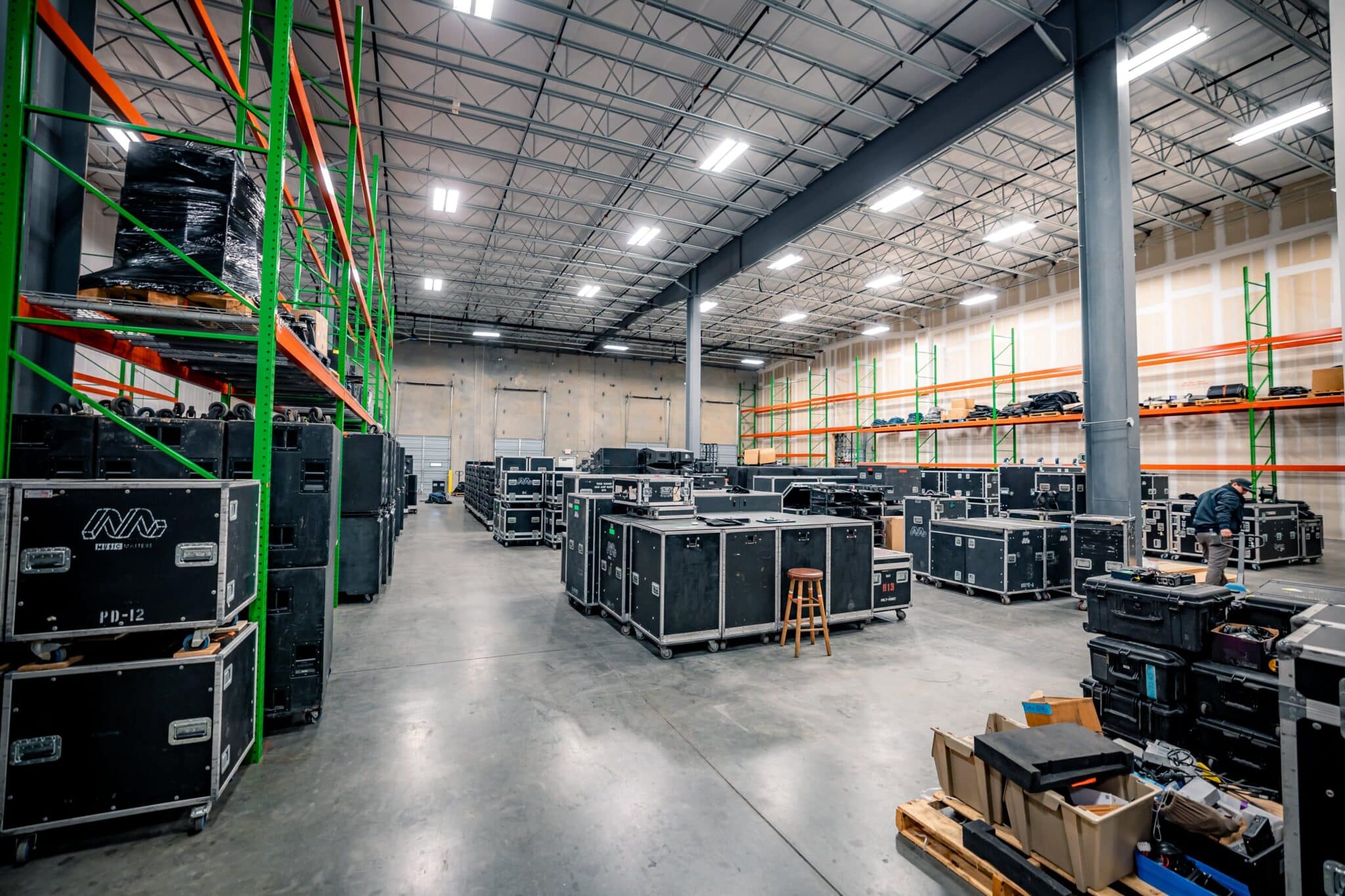
Company adds 20,000 square feet to meet growing demand
Music Matters Productions (MMP), a premier provider of audio, lighting, video, staging and rigging solutions, has expanded its metro Atlanta headquarters, increasing the total warehouse footprint from 40,000 to 60,000 square feet.
In addition, MMP has opened a second 10,000-square-foot building directly across the street to house its growing corporate production division.
The expansion comes in response to increased demand across touring, festival and corporate markets, as well as the continued growth of MMP’s high-end gear inventory. With a fully dedicated shop for each department, including audio, lighting, video, rigging and staging, the new layout provides more space for show prep, pre-rigging and crew coordination, allowing for even more efficient load-ins and streamlined execution.
New features
The rigging department now features a new mobile motor hoist test stand, allowing for in-house motor certification, a service that’s now available to external clients in the production community.
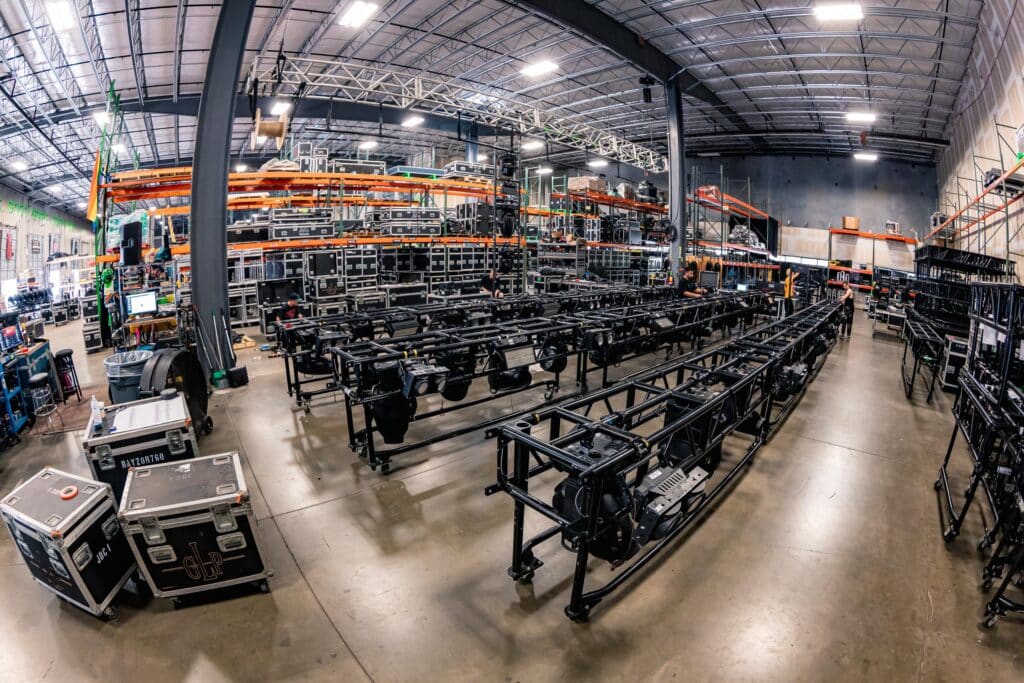
Five new truck bays were added in the process, as well, bringing the total number of bays to 17 — an important upgrade for MMP’s fleet and the increasing number of shows moving through the warehouse each week.
“This growth is a direct reflection of the work our team puts in and the trust our clients place in us,” said Aaron Soriero, owner of Music Matters Productions. “We didn’t expand for the sake of being bigger, we expanded because we needed the space to do the job right. More room means tighter prep, faster turns and better support for our clients.”
Expanding operations
The expanded warehouse and building across the street include additional offices, mixed-use areas and a dedicated repairs department, giving the team more capacity to prep, collaborate, QC and scale for increasingly complex events — both corporate and entertainment.
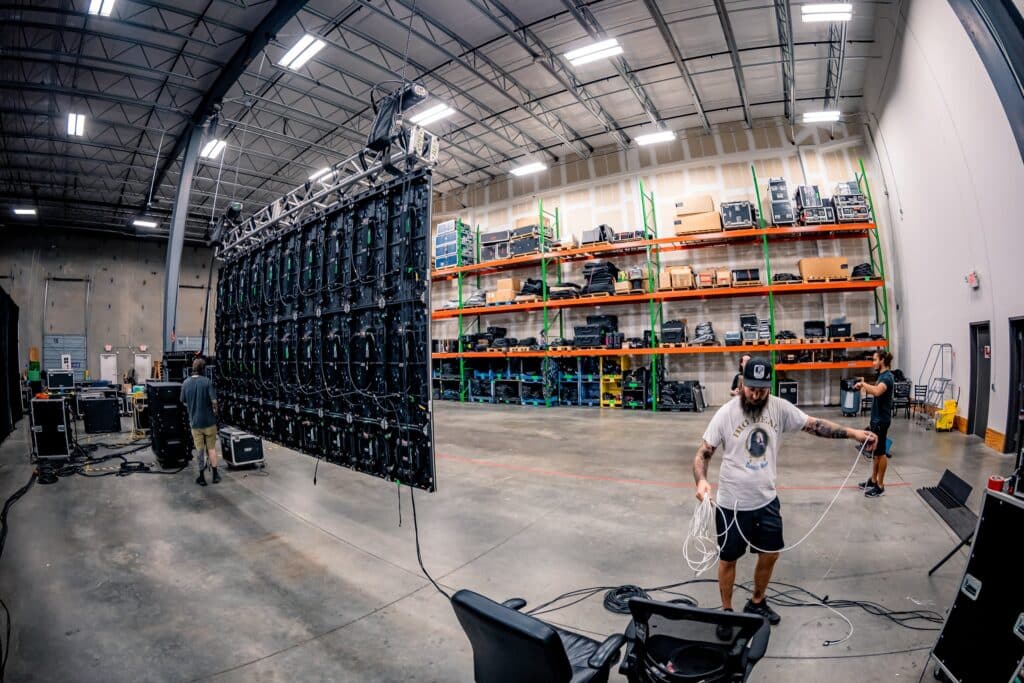
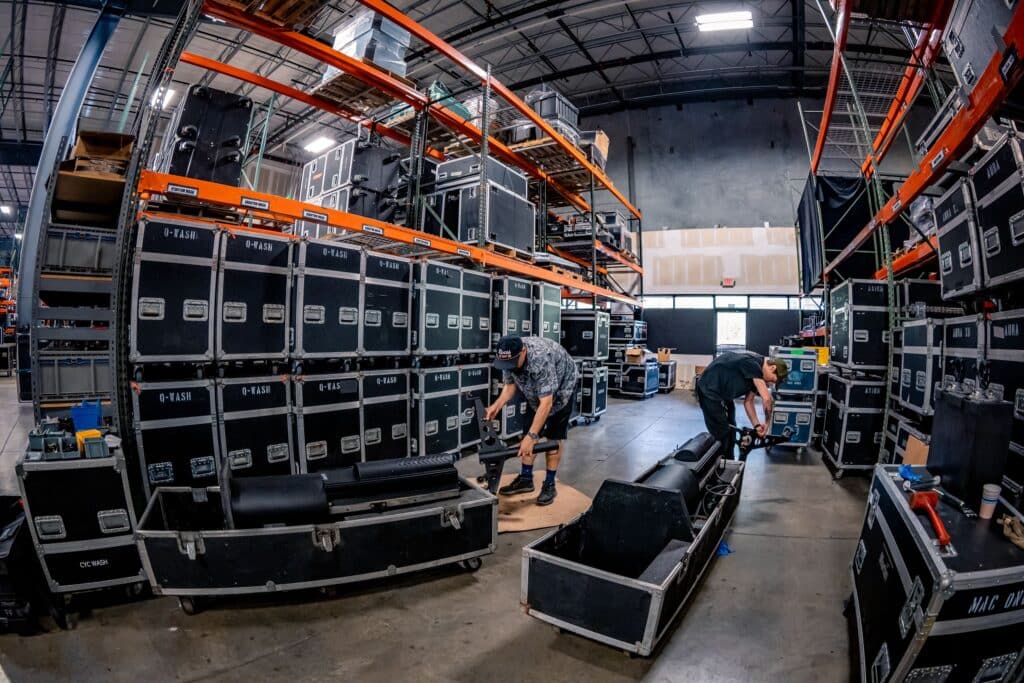
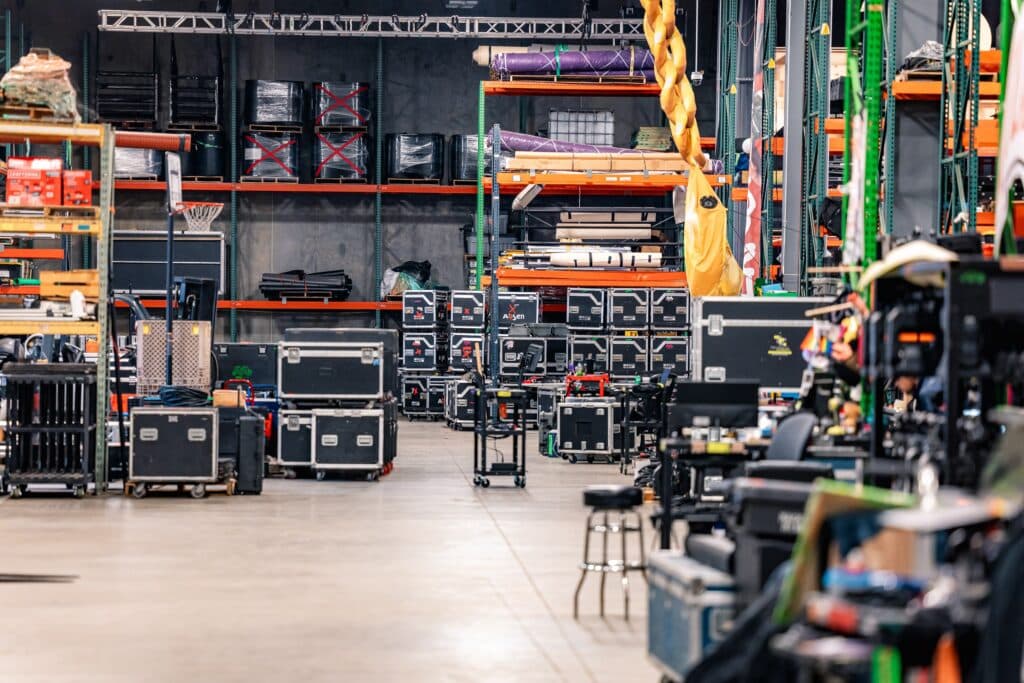
With a reputation built on reliable gear, experienced crews and an enhanced client experience, MMP continues to solidify its role as a go-to production partner for events of every size and setting — whether it’s a beachside festival, a stadium tour, brand activation or a high-stakes corporate show.
About Music Matters Productions
Music Matters Productions is a full-service live event production company based in Peachtree Corners, Georgia, providing industry-leading audio, lighting, video, rigging and staging solutions for tours, festivals, brand activations and corporate events across the country.
Known for its high-end inventory, seasoned crew and deep dedication to doing the job right, MMP supports hundreds of productions each year and is trusted by clients nationwide.
For more information, visit mmp-atl.com.
Related
Business
From Boardrooms to the Himalayas: Vandana’s Journey to Purpose and Growing with Intention [Podcast]
Published
2 weeks agoon
May 19, 2025
How one family blends operational clarity, conscious leadership, and community-driven values to grow their business — together.
In this episode of UrbanEbb, host Rico Figliolini chats with Vandana Aggarwal, VP of Operations at Aggarwal Real Estate, about the winding road from global consulting to family-run commercial real estate in Norcross, Georgia. With honesty, warmth and insight, V shares how she went from working 80-hour weeks in corporate strategy to rediscovering clarity in the mountains of India — ultimately helping transform her family’s business into a community-driven real estate firm managing over 50 shopping centers.
The conversation weaves together themes of leadership, legacy, operational excellence and the transformative power of both AI and yoga. It’s a story about clarity, courage and conscious growth — both in business and in life. This is another episode you won’t want to miss.
Episode Highlights
- Why Vandana left a high-powered consulting career to join her family business
- How hiking Kilimanjaro and studying yoga in the Himalayas changed her leadership mindset
- The operational overhaul she brought to Aggarwal Real Estate to support growth
- What it’s like working side-by-side with your dad, siblings, and 700+ tenants
- How the company rebranded with intention and built a mission around “building communities as a community”
- Where AI is reshaping real estate—from lease drafting to property management—and where it still can’t compete with people
- Leadership succession planning with siblings at the helm
- The importance of clarity, calm, and conscious growth in both business and life








About Vandana Aggarwal
Vandana Aggarwal is the Vice President of Operations at Aggarwal Real Estate, her family’s commercial real estate investment and management firm. She brings a unique blend of strategic insight and operational excellence, shaped by her early career as a consultant at A.T. Kearney, where she advised Fortune 100 to 500 companies. A graduate of Georgia Tech, she also took a transformative detour from the corporate world to spend a year in India teaching yoga—an experience that continues to influence her leadership style today. At the core of her work is a deep commitment to family and a passion for building strong, connected communities.
Timestamp:
00:00:00 – Introduction and sponsors: Vox Pop Uli & EV Remodeling
00:03:12 – From Georgia Tech to global consulting
00:04:23 – Leading strategy for Fortune 500 companies
00:06:11 – The role of vision alignment at the C-suite
00:08:01 – Sabbatical becomes family business overhaul
00:09:35 – Bringing operational excellence to a growing real estate firm
00:12:02 – A year of yoga, nature, and healing in India
00:17:03 – Hiking Kilimanjaro, testing limits, and expanding self-trust
00:18:52 – Navigating family dynamics inside a business
00:21:56 – Planning for leadership transition: siblings, strategy, succession
00:24:06 – Rebranding the business: from American Management to Aggarwal Real Estate
00:26:33 – Where AI fits (and doesn’t) in real estate operations
00:30:04 – Legal, leasing, HR, and marketing efficiency with tech
00:31:01 – Community-focused retail and experiential shopping centers
00:32:00 – Reflections on AI, journalism, and digital trust
00:32:57 – Closing thoughts
Podcast Transcript
00:00:00 – Rico Figliolini
Hi, everyone. This is Rico Figliolini, host of UrbanEbb. This podcast comes out of the city of Peachtree Corners, and we have a special guest today. And if I don’t mess up the name, it’s Vandana Aggarwal.
00:00:15 – Vandana Aggarwal
Absolutely. You can call me V, Rico.
00:00:15 – Rico Figliolini
I’m going to call you V, trust me. And I’m Rico Figliolini, so a bit of a long name there. But V is VP of Operations of Aggarwal Real Estate here, based in Peachtree Corners? No, Norcross.
00:00:30 – Vandana Aggarwal
In Norcross, yeah. Norcross, Georgia.
00:00:32 – Rico Figliolini
Yeah, yeah. Just off 85, and?
00:00:34 – Vandana Aggarwal
Jimmy Carter.
00:00:35 – Rico Figliolini
And Jimmy Carter.
00:00:36 – Vandana Aggarwal
We’re completing each other’s sentences already.
00:00:39 – Rico Figliolini
But where are we doing this? We’re doing this from one of our great sponsors, one of our two great sponsors, Vox Pop Uli. Was this tastefully obnoxious? Let me tell you, I asked them to do a corner cut for us, and this is perfect. So they have the Moxie logo and stuff. So they’re branding, right? Same way they can brand your stuff. They’ll put your logo on anything. They’ve done, I think, 6,000 vehicle wraps. They’ve done garments, obviously. They could do one-offs or they could do 1,000. They do trade show booths, wraps, everything. So anything you need a logo on, think of what object you want it on. They’ll figure it out for you. And if you’re doing, let’s say, 5,000 mailers and you want that database customized for each postcard, they could do that also. It’s called data. I forget what it’s called, but they can do that. They can work the data into the printing as well. So all customizable. Check them out, voxpopuli.com. Now, getting to something we were talking about, hands-on stuff, which is this also. This can’t just be done by machines, right? Although machines, you still need people. But EV Remodeling Inc., they are a remodeling company. They can do design to build. They can do whole house renovation. They can create your deck, your backyard gazebo. They can put a bathroom, kitchen, anything you want. EV Remodeling Inc. is owned by Eli and his family. Lives in Peachtree Corners. It’s based out of our city. They’ve done, I think, over 250 homes recently. So check them out, evremodelinginc.com. And I want to thank both of them for being great sponsors of ours. So, it’s always a long stretch doing that, but I’m glad to have you, V.
00:02:22 – Vandana Aggarwal
I’m happy to be here. Thank you for inviting me onto your podcast. Excited to chat with you.
00:02:25 – Rico Figliolini
Yeah, no, this is cool. Well, you know, I met you, where did I meet you at? I think it was the chamber.
00:02:30 – Vandana Aggarwal
Yeah, the Southwest Gwinnett Chamber event.
00:02:32 – Rico Figliolini
Yeah, and we were talking a bit, and I was like, damn, you know, I had my father owned a business, and he wanted his kids to be in it. None of us, none of us could go into that business. It’s a little difficult, different industry. It was a hard industry, plus my father was very patriarchal, very over-demanding. God bless him. He mellowed in age. But when you were telling me about your family, I mean, your father, your mother, your sister, your brother, and you, I mean, all in it. It’s amazing.
00:02:55 – Vandana Aggarwal
We’re all together. We’re the modern-day Brady Bunch.
00:03:03 – Rico Figliolini
I love it. Yes, that’s exactly it. But, let’s start a little bit. I mean, you were telling me, I mean, you came from a consulting world. You came where you were actually being paid a lot more than you’re being paid right now, actually.
00:03:12 – Vandana Aggarwal
I told my father he couldn’t afford me when he recruited me out. So I graduated from Georgia Tech in 2007. I actually did join his company right out of college for two years, learned a lot about the company. He actually had me go through a rotation in every department of the company to learn more about what we did, how we operated. And I think very quickly, it was also 2008-9 with a recession. But I was also very interested to learn how big companies operate. How can you take a small company at that time? We were much smaller than we are today and really understand how do you go from this, which is where everyone starts, right? As a new company to get to be one of the largest in the nation, in the world and see how they operate, how they grew it from, you know, a mom and pop business to this global enterprise. Consulting was a natural transition to learn about multiple companies, multiple industries. So transitioned into AT Kearney, which has now been rebranded as Kearney, and out of their Chicago office. So I was there for seven to eight years, almost eight years.
00:04:23 – Rico Figliolini
Entry-level position you got in?
00:04:24 – Vandana Aggarwal
Yeah, I went in as an analyst. The good thing with that experience was by the time I left, I was a senior manager with Kearney. I worked across 17 different companies in those eight years. So I got to experience how CPG companies, retail companies, transportation, IT, you name it, I’ve done it. In terms of the different types of industries I got to work with, worked with a lot of Fortune 100 to 500 companies at the C-suite level. So we were coming up with all kinds of strategy projects such as new market entries, mergers and acquisitions. A lot of what I ended up specializing in in those seven years was operational efficiency and growth strategy. So it was an amazing, I’m grateful for that learning experience, the you know the caliber of minds that you work with. You also get to experience what the C-suite looks like. How does the very top operate and then it goes from the top down right? So it is very much led at this very top leadership and you see how companies change in their culture the way they operate based on how the top is designed.
00:05:38 – Rico Figliolini
So did you see good and bad at the top?
00:05:41 – Vandana Aggarwal
Absolutely. And I’m not going to name names. But you learn a lot when you see how your CEO and your C-suite right below them, the culture they’re bringing into a company and their vision and their goals if they’re aligned, unaligned. Anyone that at the very top have different viewpoints of where the company has had it is where companies start to break apart, lose revenue, lose their you know people, which is very important.
00:06:11 – Rico Figliolini
Where did you see the pain point then? What was the common denominator I guess of those?
00:06:18 – Vandana Aggarwal
There’s no one common denominator, but if I had to kind of narrow in, it comes down to what is our five-year, ten-year trajectory? Where are we headed? As large companies grow, you’re not just in one industry. You’re not just doing retail shopping centers. You’re investing in all kinds of properties just to bring it back to our company. Similarly, a CPG company can make all kinds of products, so they have to decide what it is because you have to be concentrated on the right places. If you have a leadership team that is in alignment of what that ultimate goal is, right, then you have clear strategies and, you know, metrics you’re measuring your success against. So that was a big thing that I learned. Also just, you know, seeing how great leaders operate, right? Some of the best in the nation today, I got to be in the room with them and just to see how they lead is very important.
00:07:14 – Rico Figliolini
Did you see any family dynamics in any of those businesses?
00:07:20 – Vandana Aggarwal
No. You know, there may have been like a father-son duo, but when you’re looking at the very top, I won’t say it was like all in the family, right? You know, and it also becomes the size of a company, right? You know, when you get to an international scale, you’re not always blessed that every person in your family has the right skill set and experience to fill each role on that C-suite.
00:07:46 – Rico Figliolini
I’m just thinking Trump for some reason. Every kid has a job.
00:07:51 – Vandana Aggarwal
Every kid has a job.
00:07:52 – Vandana Aggarwal
You had the accent, right?
00:07:54 – Rico Figliolini
Pretty much, I guess. So after the C-suite or expansion, you traveled a lot too, I think, right?
00:08:01 – Vandana Aggarwal
I did, yeah. So after my seven, eight years in consulting, I was reaching 30. And Shiv, my father, came to me and he said, you know, you’re doing this for a lot of outside companies. Why don’t you help us grow and bring your expertise home? And I said, look, I’ll take a sabbatical. Let me assess the company. And after that period where I took a short sabbatical to come look at how we were operating, I said, I can give you three years. I said, you can’t afford me, but I’ll give you three years of my time. And I said, I think it’ll be the right, it was the right time in the company. We were investing very heavily. We were bringing in a lot of new square footage into the company, and we weren’t designed to manage it. So we as a company, as you know, we are the investors. We have an in-house management company, an in-house leasing company. So as we acquire new properties, our team does the management for those properties in-house. We don’t provide third-party services today. And we do the leasing in-house. But at that time, when he, you know Shiv started we had one or two and now we’re at 50 shopping centers plus and other investments that we have. And there’s a very different way you operate you know and how do you how does the CEO go from being an operator to where he’s overseeing it, but he’s not into the weeds right? So he has create a system for that to happen right? You have to have standard operating processes for your property managers, your accounting team, your marketing team.
00:09:35 – Rico Figliolini
And you quite didn’t have that before.
00:09:37 – Vandana Aggarwal
We didn’t, no. And, you know, and I think that’s why he wanted to bring me in is because my strength is operations and I love it. I love going into messy places and cleaning them up.
00:09:49 – Rico Figliolini
Is that what you did when you were a consultant?
00:09:51 – Vandana Aggarwal
A lot of what I was concentrating on at the end of my consulting career, yes. So I did a lot of operational efficiency work. So we’d go in, assess the way companies were designed. And we’d interview hundreds of team members to understand what their role is. You know, what are they responsible for? How are they delivering? What are they measuring for success? And then we’d redesign the way they did that based on, again, bottom line, what are your ultimate goals for the company?
00:10:21 – Rico Figliolini
So you had to understand that before you got to that point. And you’re not making the decisions, the C-level.
00:10:29 – Vandana Aggarwal
Present, right? And similarly even with Shiv, when I first joined, I said, look, this is how I think we need to redesign the company from a bottoms-up perspective based on ultimately our goal of growth, doubling, tripling in size over the next ten years. And I think this is where the father dynamic came in. I guess he trusted me. And he said, do it. He just said, do it. And it was beautiful because right when you’re with large companies, it’s a lot of time before you get. Those decisions made and that trust, right? And so it was great. And he said, yeah, just put it into place.
00:11:07 – Rico Figliolini
See, that’s a great dad, actually. Some dads would be like, I don’t know about that daughter or son or whatever.
00:11:16 – Vandana Aggarwal
It did take time, though, like to ultimately, he was in the operation so heavily. And, you know, until today, I’m still like, step up, step up. Like, I need you to not get into the weeds. Like I think at that time we had tenants calling him, maintenance guys calling him. Like every little and big problem would go through his cell phone. I said, you’re too smart and you’re such a good investor. This is not your skill set. You shouldn’t be managing this. You need to bring people on who are expertise in this area. And I said, you need to be focused on like the larger plan.
00:11:51 – Rico Figliolini
This way you can grow it better.
00:11:51 – Vandana Aggarwal
Which I think has been very successful over the last eight years I’ve been with him now.
00:11:57 – Rico Figliolini
So before you got to him, though, you were traveling a bit internationally as well?
00:12:02 – Vandana Aggarwal
Yeah, yeah. So this is an amazing year. I was very burnt out. By the time I left consulting, I was working 70 to 80-hour weeks, traveling Monday through Thursday, if not more than that, of the week. So I told Shiv, I was like, I’m going to take a month. I’m going to go to India, get my yoga certification. No intention to teach at the time. I just said it’d be a great one-month retreat. And I was up in the mountains like Himalayas and India in a city called Dharamshala. Beautiful place. One of my favorites in the world. And I just, I think I needed it for myself emotionally, mentally to take that break. So I turned one month into one year. I didn’t know it was going to be a year.
00:12:49 – Rico Figliolini
In that same city? In that same town?
00:12:50 – Vandana Aggarwal
Yeah, so I ended up the school that I had gotten my certification with. I asked them, I was like, do you mind if I hang around for a little while? Like very casually, I’m like, you know, I’ll pay for my room and board, but I just want to be around this group and this energy. And they said, well, if you’re going to be here, why don’t you intern? And they’re like, room and board is free if you intern. I was like, sure. You know, not thinking what it was leading to. This is like that beauty of the universe coming into play. Yeah, so I started teaching, ended up loving teaching. So then I ended up teaching the 200-hour yoga training course. And I was in Dharamshala for four months. And then I moved down to Goa, their Goa campus for another six.
00:13:30 – Rico Figliolini
Where is that? Goa?
00:13:32 – Vandana Aggarwal
Goa? It’s in southern India on their west coast. It’s a beach town. Yeah. So I had the mountains and the beach. But I’m a mountain girl. I’m a hiker. But no, it was a beautiful experience. Very different from anything I’ve done with my career, right? But I became a yoga teacher for a year.
00:13:52 – Rico Figliolini
Did that clear your head? Yoga, they say, can do that, right?
00:13:53 – Vandana Aggarwal
Yeah, it’s all the tools of yoga, right? The meditation, the breath work, really getting internal, going in, right? Just going inwards, being quiet, which we don’t have. We have a lot of noise in our life today, you know? And naturally, right? Between family life, work life, social, and then just all of the noise from everything else right? Like we’re sitting here and I can hear the cars right? So you know that difference was when I was sitting there, I could hear the ocean waves and so there’s something very healing in nature naturally. So it was the tools mixed with nature and I still think nature has a very strong healing power on us. So whenever I can, I try to get out on a mountain and by the ocean. But yeah no it was it was a beautiful experience but it did bring a level of calmness into the way I approach things. It changes your perspective of you know at the end everything’s okay. No matter what you’re going through it’s temporary you’re, and everything that’s happening to us is happening to us for the good. We don’t know it, sometimes it seems like a bad situation in the moment, but ultimately you know, universe, God, whatever you believe in is at play to bring you something better in your life. And you just have to step back to understand what is it delivering us.
00:15:19 – Rico Figliolini
I like the way you think. My wife every once in a while would say, aren’t you upset about that? I’m like, I think come tomorrow, it won’t mean anything. There’s no point in, just relax. Not everything, two days later, it’s not as important as it seemed at that moment.
00:15:37 – Vandana Aggarwal
Yeah. And it’s not just that it’s not as important. It’s also like…
00:15:41 – Rico Figliolini
In perspective?
00:15:42 – Vandana Aggarwal
It’s, what am I gaining from this? Like, what can I gain from this? Oftentimes when, you know, a lot of things happen, yeah, like you get hurt or, you know, it’s like in relationships, right? Or if you have a bad business deal, right? It’s like, hey, how am I growing, right? And I think that’s what makes life very exciting, right? Otherwise, if you’re always living on a high, is it a high?
00:16:06 – Rico Figliolini
Yes. So I’m thinking you were a consultant for seven or eight years. 80 hours a week. And all of a sudden you’re doing yoga on the mountains of India. It’s just like, it’s almost like a movie. It’s almost like…
00:16:18 – Vandana Aggarwal
Eat, pray, love?
00:16:19 – Rico Figliolini
Yes.
00:16:20 – Vandana Aggarwal
It was my eat, pray, love moment for a year.
00:16:23 – Rico Figliolini
That’s amazing.
00:16:24 – Vandana Aggarwal
No, you meet amazing people, but I think we were meant to meet everyone that we come in interaction with on a daily basis. You naturally have a connection. There’s a universe at play, and we were meant to cross paths and learn something from each other, gain something from one another, give to the other person. And I think you just have to look at life that way.
00:16:48 – Rico Figliolini
I definitely think along that way. I mean, I definitely think each of us nudges each other in a crowd a little bit. That one nudge can set you off going in a different direction. So I totally believe in that. So you joined your dad. Yes. And you’re, so actually, even before we get there, so yoga, but what other interests have you been?
00:17:03 – Vandana Aggarwal
Yeah. So, I mean, I’m an avid hiker. I’ve done recently in the last few years, I’ve climbed Kilimanjaro. I did the Machu Picchu trail. I’ve done a few 14ers out in Colorado, but I like to test myself physically. You know, just, again, it comes down to how do we find that push within us past our comfort zone? So is this a physical inability or is it a mental constraint? So to get past that mental constraint of discomfort and then really push yourself to the next level and say, I can achieve something. It’s not going to be easy. So to me, if I’m on a hike and it’s not hard, I’m like, well, was it a hike? Like it didn’t test me, but no I think, you know.
00:17:55 – Rico Figliolini
You should do the Appalachian Trail. That’s like 2000 plus miles.
00:18:03 – Vandana Aggarwal
I know. And it is, you know, it’s not just like the hiking part. It is like living out in nature and, you know, sleeping in uncomfortable conditions. Yeah. Walking in the rain. It’s cold. I think the last day of our Kilimanjaro hike, it was negative 20 degrees up in the mountain and my eyelashes were frozen and I couldn’t feel any part of my body. And, you know, and it tested my breathing. And there is that element of push yourself to the point that it’s not your ego anymore. Like if your body’s saying stop, you have to stop as well and respect your body. But yeah, to really test yourself.
00:18:38 – Rico Figliolini
To circle all that back now, you’re back home. You’re working with your father and your family. A lot of businesses grow or die because of family. If it’s a family business, right?
00:18:52 – Vandana Aggarwal
Absolutely, yeah.
00:18:53 – Rico Figliolini
So you have your highs, your lows, your, sometimes you don’t get along. Sometimes decisions are split. People get upset with each other. So you’ve been at your highs and lows physically and mentally doing other things. Has that helped you in some ways? Not that you’re having a bad time with family. Because it sounds like you all fit just fine, like the Brady Bunch.
00:19:15 – Vandana Aggarwal
Let’s keep it that way. No, I mean, there’s multiple dynamics at play. It is a family business. My father is also my boss. My siblings are also my friends and my coworkers. And it’s about no matter how hard you try, you cannot separate those relationships. There is an interplay of all of it when you spend eight to nine hours a day together. But we all have, again, a common goal for the company. And then a common goal for our personal relationship. So when we sit down, we keep in mind that we like each other and we want to keep it that way. Like very simply put, that’s first and foremost for me especially. Even when Shiv had brought me in, he said, oh, can you manage everyone? And I said, I’ll manage everyone but my brother and sister. I said, you know, like I won’t jeopardize the relationship I have with them as a sibling by being their manager. Especially because I said that’s your job like good luck. But not just that it’s you know we all have different skill sets so I said how do I manage my brother who is a genius he’s a CPA by trade you know like I can’t tell him how to run the financials of this company like he’s supposed to teach me that right? And same way I teach him that. My sister has a master’s in marketing right? She is by far the most social, likable person you’re going to meet, and she knows how to work with people. I said, she needs to teach us that. So I think we’re lucky that each of us, and this is, I think, rare, where you have three kids and each one of them has their own skill set. That, I think, helps us stay in business and we see ourselves foreseeably into the long-term future being in business together is because we each bring something very unique to the table. Ultimately we value the relationships that we have on a personal level as a family above all else right? And then you know the element of like, how does the yoga experience a hiking experience teach us. That’s, it’s not specific to anyone’s situation, I think it’s a baseline of who you become right? The foundation. Like it teaches you patience, it teaches you again, everything is temporary so let’s not get overly attached emotionally or get upset or too joyful, even like, let’s just stay neutralized on any situation because it will end. And then the next one will come up and kind of flow with the ebbs and flows of the ocean. You, you flow with everything that comes with you, comes your way at work, at home. But yeah, I mean, we do sit down as a leadership team. I, my father and my siblings and I, and we talk about, hey, we separately do the exercise. Where are we going to be in five years? What role do we play in that journey? And thankfully, all of ours are very similar in what our goals are. And then we have different skill sets that we bring. So even as we design the future of the company in a moment where my father is not at the head of the table, we’re working on that redesign work. But it’s very conscious. It’s very intentional. Again, we all step back and say, hey, look, how do we maintain, how do we solve problems? Because like, you know, we were talking about how tomorrow we may not agree on something, a big decision. What are we investing in? Come back to, you know, right now Shiv gets to make an ultimate decision because he’s the one leader at the top. Tomorrow it’s going to be three people at the top. How do you deal?
00:23:04 – Rico Figliolini
So is there an exit plan for your dad? Well, not an exit plan.
00:23:09 – Vandana Aggarwal
Not an exit plan. He already has. I think he, you know, he’s gone from, he’s the hardest working person I know. I get that from him. We’re addicted to work.
00:23:18 – Rico Figliolini
80 hours a week.
00:23:21 – Vandana Aggarwal
We love working. You know, this company is his baby. I think I’ve adopted it at this point and we all have. But, to stay mentally sharp, to stay alive, you have to keep working. You have to keep doing something. You have to be working towards something that brings you joy and purpose. And I think, you know, he stepped back to take time towards a lot of his nonprofit work, community work that he’s very much engaged with. But he’s still at the top. He’s still running, you know, his, you know, he’s, you know, not slowing down. You know, we’re constantly growing. We’re growing this year in a large scale, which is amazing, and he’s leading that charge.
00:23:59 – Rico Figliolini
How many properties do you own?
00:24:02 – Vandana Aggarwall
Today we have 50 shopping centers and then a few other assets.
00:24:06 – Rico Figliolini
Is that like 3 million square feet or something? 4 million?
00:24:10 – Vandana Aggarwal
Yeah, over 700 tenants. But, you know, when we sat down a few years ago, we rebranded. Aggarwal Real Estate didn’t exist until two years ago. It was American Management Services. And we had a rebranding effort because we said we want the company’s name and the brand to represent who we are.
00:24:33 – Rico Figliolini
I like that, by the way.
00:24:35 – Vandana Aggarwal
Yeah, it needs to mean something. And we were also proud of what our father has achieved, right? He’s given us this beautiful life that we get to help grow upon. So we said it needs to pay homage to him. So we said, let’s make it Aggarwal Real Estate, ARE. And then as we were deciding what that vision is, we’re a family. In the company, we are a family, not just the four of us, but all of our staff, our team. We don’t, you know, we don’t look at them separate from who we are. And so we said our mission as a company is building communities as a community. And it talks about, hey, in all of the real estate work we’re doing, we try to make sure all of our properties are beautiful. Our tenants are happy. They have direct access to each of us in the company. And on top of that, as a company, we are a community within ourselves because we can’t create them until we are one. So it was very intentional to who we already were, but putting it into brand terms.
00:25:37 – Rico Figliolini
It’s amazing. All that property, tenants. Can’t imagine father tech can send text messages on all their problems, if they have any.
00:25:45 – Vandana Aggarwal
He’s a brilliant man.
00:25:45 – Rico Figliolini
You could be too possessed on that stuff. We want to be cognizant of our time together.
00:25:55 – Vandana Aggarwal
Absolutely.
00:25:57 – Rico Figliolini
So the next subject really was going to be about also AI, because everyone’s talking about AI. We were talking about that before the show started, before we started recording, which was kind of funny because V was asking me if we edit anything. And I was like, no, straight through.
00:26:11 – Vandana Aggarwal
I wanted to see if I could say a few things and then have it taken out of this conversation.
00:26:13 – Rico Figliolini
Nope. Nope. Doesn’t work that way. So, but ChatGPT, AI, that’s all. I mean, you know, could I create a bot to edit this? Probably. But there’s so many things we use in our lives. And you’ve been talking about how it would affect your business. Nevermind the consulting work you did.
00:26:33 – Vandana Aggarwal
Yeah. I mean, the consulting world is, I mean, it depends on the industry, the type of work you’re doing. In real estate, I’ve put a lot of thought behind this. There’s a lot of conversations happening across every industry, every sector, whether it’s education, automotives, real estate, et cetera. Everything’s being discussed. How is that changing the future? How do we incorporate it to be more efficient, right? Be the best in the industry that we can be or operate better. And so for me it’s again comes down to that operations element that I think about like, how do I incorporate it for a company that’s a medium-sized real estate firm today as we become a large company, a bigger player in the market. And people are very important in real estate right?
00:27:17 – Rico Figliolini
Talk about editing?
00:27:20 – Vandana Aggarwal
I was telling you, we should bring them into the podcast.
00:27:27 – Rico Figliolini
We’re going to run a little longer on this.
00:27:36 – Vandana Aggarwal
But let’s take retail shopping centers. This is brick and mortar. I did a paper actually for a large mall retailer back in my consulting days on how the title of the paper was, is brick and mortar dead? And, you know, full circle, I am fully dedicated to brick and mortar, retail, office, multifamily now. But you still need people to clean up your properties, fix your maintenance issues. We were talking about roofing, plumbing, electrical. That is hands-on work. You know, today there is, it’s going to be a long time before there’s a robot that comes in to do that. There will be. I don’t know. I do not see that in 10 years to say we’ve got roofers that are robotic drones that are going to come fix my roof problems.
00:28:24 – Rico Figliolini
Zumbas, they’re going to run around the roof or something.
00:28:26 – Vandana Aggarwal
That’s actually genius. A Zumba for my roof.
00:28:31 – Rico Figliolini
Why not? Attach it to the right thing.
00:28:33 – Vandana Aggarwal
But so those are very people-oriented roles today. Technology will advance how quickly it’s done or how well it’s done. But you’ll still need someone to operate the machinery of it and everything.
00:28:49 – Rico Figliolini
Just not as many.
00:28:50 – Vandana Aggarwal
Yeah. Construction, similarly, right?
00:28:54 – Rico Figliolini
Unless you 3D print a house. I’m sorry.
00:28:56 – Vandana Aggarwal
No, it’s true. It’s true. There’s so many options. I’m thinking 10 years now. I’m not going to have a 3D printer making the metal framing for my new construction project. You know, or installing the sheetrock, it does probably speed up the process, right? There will be machinery to help with that, a lot of AI development in that way. It’s a lot at an office administrative level, right? The speed in which you’re processing invoices, the speed in which you are, you know, getting payments taken in. Today, I would say as far back as right before COVID, we were still accepting checks for money. Now it’s all online. Like we do not accept money coming into the office, or it’s very limited to what we do, right? So that’s AI, if you think about it, right? The ability to pay online.
00:29:42 – Rico Figliolini
QuickBooks Online uses AI now, you can enable it.
00:29:47 – Vandana Aggarwal
So we’ve been using it for many years. The advancement of it has been a little bit slower, and now it’s sped up. Marketing, we were just talking about how you created a flyer on ChatGPT, was it?
00:30:00 – Rico Figliolini
I won’t talk about the student that’s helping us out here and how they use AI.
00:30:04 – Vandana Aggarwal
No, AI in school, right? But yeah, it’s an AI processor for my HR roles, right? Instead of reading 100 resumes, it’s going through the system to filter them out. Whether it’s writing contracts, I won’t lie. Legal jargon is coming out of ChatGPT today. And so it’s speeding up the way we’re doing work. But my legal team probably, and they won’t say it, should be using AI if they’re not. To help create some of this work right? So it’s like these companies are still going to be needed, but the way that they’re able to respond to us at a quicker, everything would just happen faster right? From typewriters to computers, everything.
00:30:49 – Rico Figliolini
Especially if they know that they just did a lease from you for this property in Texas, that we need three more leases done for three other places, it’s not going to be that much different, right? It’s a template.
00:31:01 – Vandana Aggarwal
It’s coming out a lot faster. Yeah, I mean the negotiations, that’s a people-to-people thing right? So I think thankfully in the real estate world we’re still going to need people. We’re still going to need buildings right? The way built, we were just talking about how a retail shopping center is no longer just for shopping. It has to be for entertainment. It has to be for bringing families in and giving them more than just, hey, go into a TJ Maxx and buy something, right? It’s like, what else are you getting when you’re at that center? Whether it’s a play space or events, we’re starting to do more events at our shopping centers. So it’s, again, serving the community.
00:31:39 – Rico Figliolini
We’re seeing that more. More of that happening. We could go on and on here.
00:31:46 – Vandana Aggarwal
Chatting with you.
00:31:46 – Rico Figliolini
Yeah, and we should probably do one on either AI in the marketplace. Or maybe a panel discussion on something similar.
00:31:51 – Vandana Aggarwal
Yeah, overall, yeah. That would be exciting.
00:31:55 – Rico Figliolini
Yeah, I think that would be cool.
00:31:56 – Vandana Aggarwal
I think it’s interesting to learn about kind of where every industry is heading. It impacts all of us.
00:32:00 – Rico Figliolini
For sure. I mean, the magazine business, I mean, it’s all like we have certain, we have AI rules. But, you know, AI is still being used to degree to research things. And to do certain things like that. You know, hopefully journalism isn’t just handed over. They do say 40% of the internet is AI written. So, which is kind of incestuous almost because it’ll just feed on itself at some point.
00:32:27 – Vandana Aggarwal
There’s a whole discussion about the validity and the trust behind digital content. In the next few years. I think it’s going to diminish.
00:32:35 – Rico Figliolini
Oh, yeah. I mean, I’m seeing videos now and it’s just like, it just looks so real. And you could not tell the difference, even voice-wise.
00:32:42 – Vandana Aggarwal
And that’s scary to think. It’s like, how do you trust what you see?
00:32:47 – Rico Figliolini
So on that note, and since this is not edited, so this is right from the beginning. So this is all true. But I want to thank everyone. I want to thank you, V, for being with me.
00:32:57 – Vandana Aggarwal
Thank you so much for having me. This was a great conversation.
00:33:01 – Rico Figliolini
It went by way faster than some of these go. So this is a great discussion. Thank you, everyone. I appreciate you for joining us. Thank you for Vox Pop Uli for the studio look and for letting us do it here, for being a sponsor and for EV Remodeling. Also, I want to thank Jeremy Pruitt behind the camera who has taken care. He’s a Paul Duke student. And it wasn’t him that I was talking about before, by the way. But all the work he’s done on the back end on this. So thank you, Jeremy. So thank you all. Thanks for being with us.
Related
Business
Peachtree Corners Grows Business Opportunities Through Economic Development
Published
4 weeks agoon
May 6, 2025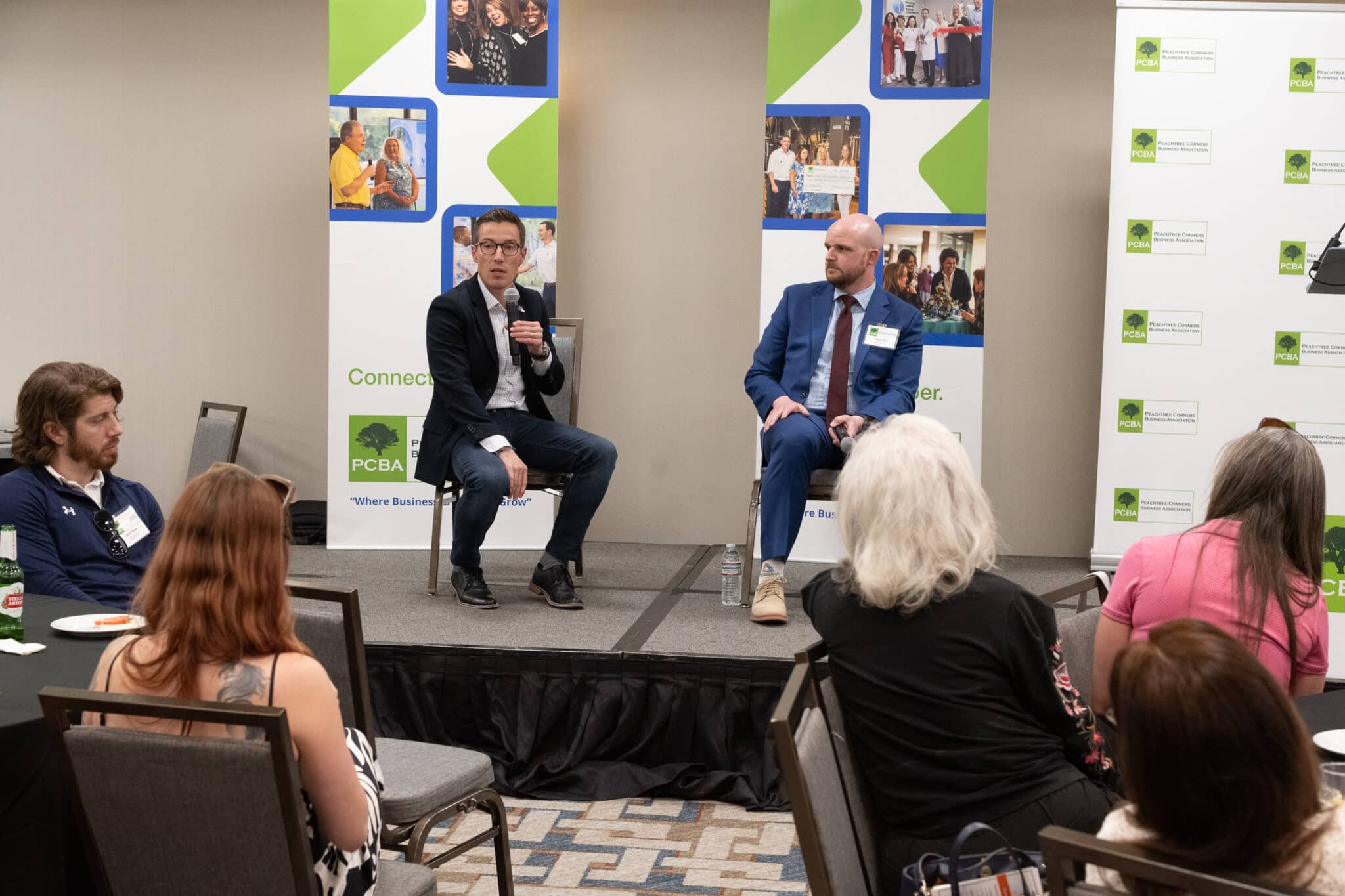
Most residents and business owners in Peachtree Corners probably think they know all about the economic development and strategic planning of Peachtree Corners, but do they really?
Peachtree Corners Business Association invited Peachtree Corners Economic Development Director Betrand Lapoire and Partnership Gwinnett Director of Economic Development Andrew Hickey to its After Hours Speaker Series on March 27 to discuss the city’s growth from a 1971 master plan to a bustling city with 42,000 inhabitants and 40,000 jobs.
Key points included the importance of business retention and expansion, with 24 projects last year creating 1,600 retained jobs, 1,600 new jobs and $250 million in new capital investment.
The Curiosity Lab, a world-class innovation center, was emphasized as a significant attraction. The city’s zoning and infrastructure plans were also discussed, focusing on balancing office and residential development to maintain a vibrant, sustainable community.
Matching jobs to residents
Although Peachtree Corners is just a teenager in terms of being an incorporated city, the foundation for this vibrant, fast-paced economic hub was laid more than 50 years ago by technology pioneer Paul Duke.
“Peachtree Corners was the first master-planned, business innovation technology park in metro Atlanta,” said Lapoire. “It was in response to the brain drain of technology with Georgia Tech graduates leaving the area.”
While the city may have a small-town feel, it’s the largest in Gwinnett County by population, but not land mass, he added.
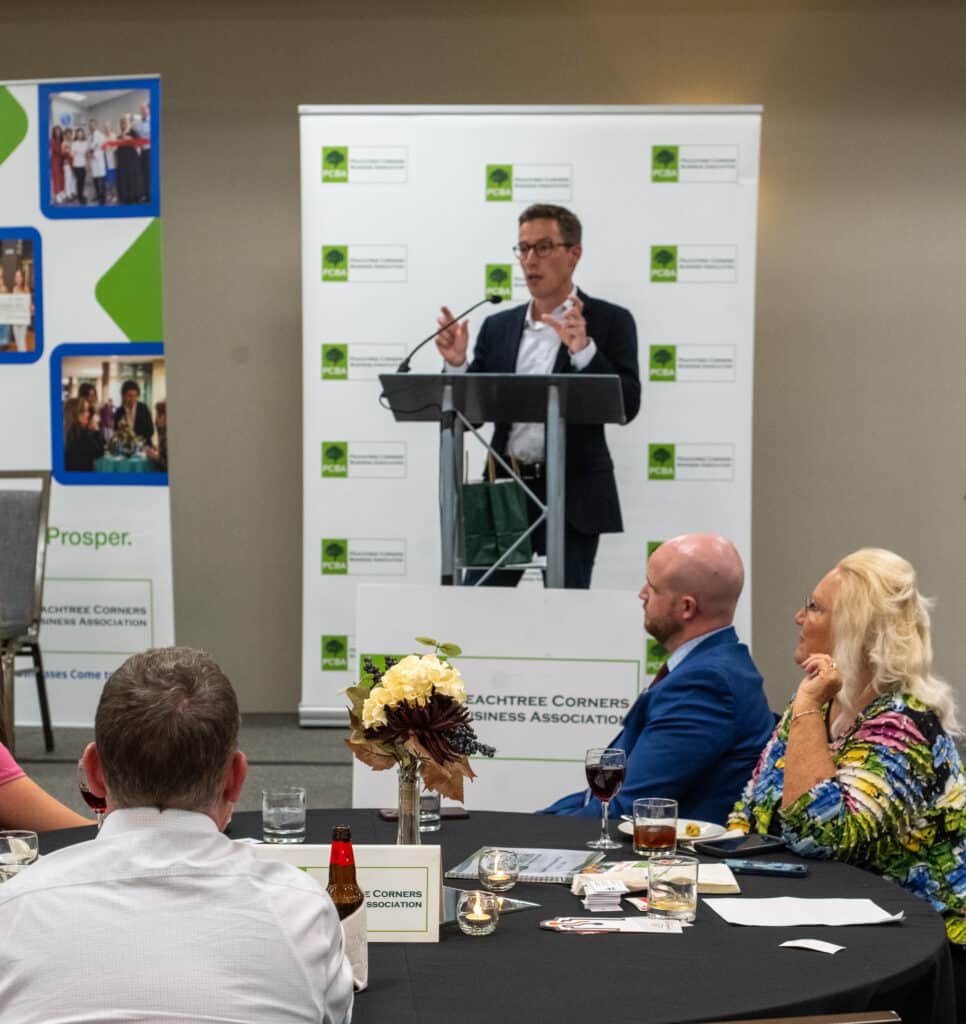
“The city started from a commercial, industrial, R&D base and then was expanded around it,” said Lapoire.
Though home to more than 42,000 residents, most of the jobs in Peachtree Corners are filled by people who live outside the city, he added.
“So we have this interesting mismatch, in a way, although not unusual,” said LaPoire. That creates traffic and transit issues. So that means that one of the solutions is to create more jobs here to fit the profile of the community.”
He presented charts that show professional services, consulting and engineering as the largest job categories. The next tier of businesses are wholesale and manufacturing.
“So we have a good mix of industry,” he said.
A five-year plan
The city has a five-year economic development plan (2023-2028) that outlines strategies for attracting and retaining businesses, with education and workforce development being key components.
Partnership Gwinnett has similar goals as Peachtree Corners, but on a larger scale.
“We are the county’s sales and marketing arm for all 17 cities now, and we receive funding from both municipal sources as well as existing businesses here — both in Gwinnett and outside of Gwinnett as well,” said Hickey.
He shared how Partnership Gwinnett is designed to drive a lot of major corporations toward doing business inside and with Gwinnett County.
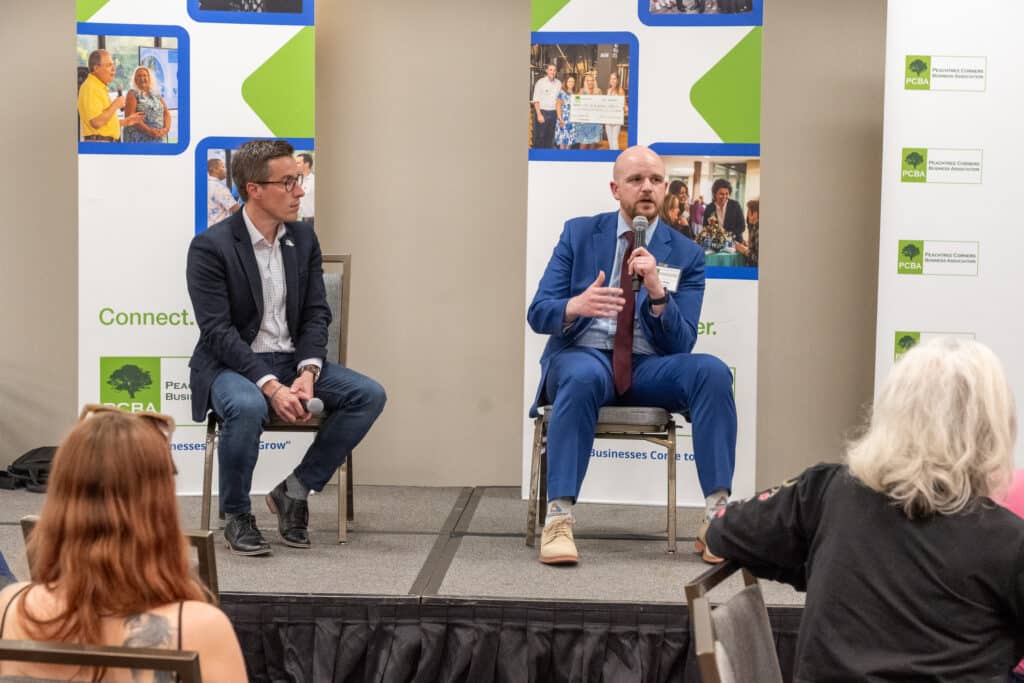
“One of the biggest things that we talk about that I’m sure it seems like most of us here, if you live here, you work here, you understand it. It’s the diversity that exists here in Gwinnett,” he said. “With a diversity index of 85, that means if we walk out of the Hilton here and we say hello to somebody, there’s an 85% chance they’re from a different ethnic or cultural background than ourselves, which to you and I may seem normal because that’s the life that we live in.”
He added that for companies, there’s a tremendous value in that, whether they have stated values, or they’re just making hiring decisions to get a wide range of candidates to fill those roles. Additionally, because of the proximity to Atlanta, Gwinnett County has a great labor draw.
Partnership Gwinnett
Partnership Gwinnett plays a significant role in recruiting businesses, expanding existing companies and developing the workforce. Hickey showed how the organization was involved with more than 24 projects last year.
“A majority of those were expansions, and that is a common thread you’ll see in economic development,” he said. “In business retention, expansion is so vital to working with our existing companies to make sure that they have the resources they need.”
He added that’s what leads to new investment and job creation in the community.
The organization also focuses on redevelopment projects, working with cities and the county to improve infrastructure and community amenities — especially strong educational institutions such Georgia Gwinnett College, Philadelphia College of Osteopathic Medicine and others.
Quality of life
In closing, both men stressed the importance of recruiting companies and developing the workforce, along with one aspect that means a lot but may not be as obvious — quality of life.
“It’s definitely evident that people like to work where they live — the whole live, work play experience,” said Hickey. “I joke that the part that people really have the most questions about, and are most excited to learn about, is new events at The Forum or Gwinnett Place Mall.”
Although they want to know what’s the next major company coming to Gwinnett, people REALLY want to know about how to spend their leisure time.
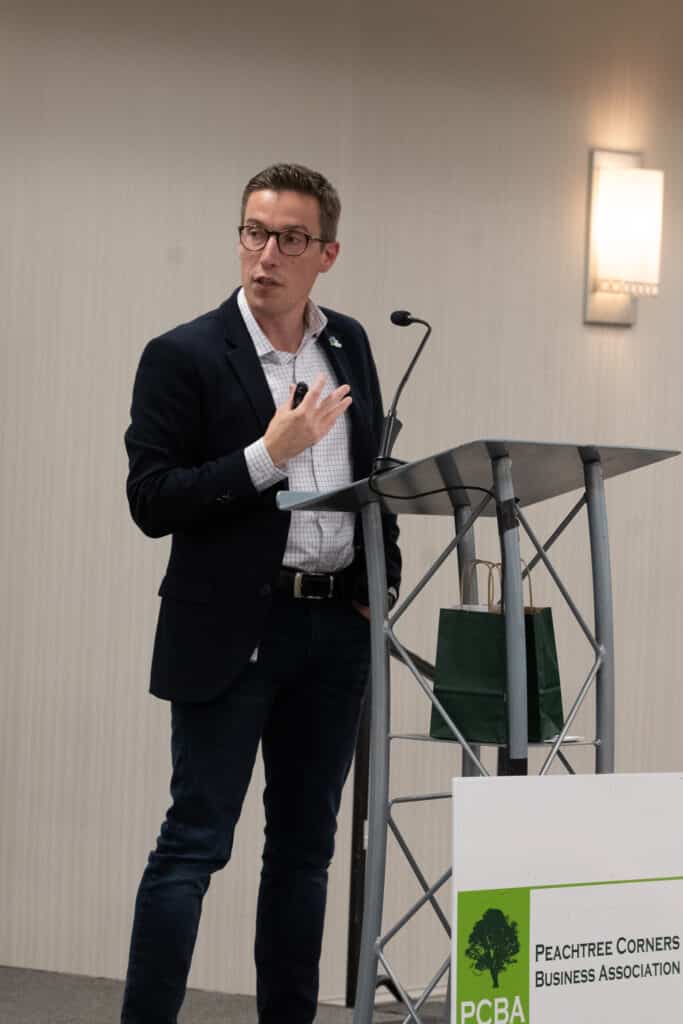
“That speaks to the importance of ensuring that we have a great community,” he said. “So at Partnership Gwinnett we work with all of our cities, and the county government as well, [on] a kind of a best-practices trip.”
He added that the peer tour allows everyone to know what the neighboring communities are doing and share the good news.
“We will take all of these elected officials, but also city staff, to different cities across the Southeast,” he said. “Last year, I believe they went to Huntsville, and have been to Greenville, Chattanooga — all cities that have done some really cool redevelopments that have taken their city to the next level. Our goal is to learn from them.”
Related
Read the Digital Edition
Subscribe
Keep Up With Peachtree Corners News
Join our mailing list to receive the latest news and updates from our team.
You have Successfully Subscribed!

From Boardrooms to the Himalayas: Vandana’s Journey to Purpose and Growing with Intention [Podcast]

Guardians of the Jukebox to Play the VoxStage on May 31

Brandon Branham Honored for Transformative Leadership in Peachtree Corners

Music Matters Productions Expands Peachtree Corners Headquarters

“Geek Culture” Shines at 2025 MomoCon

Celebration and Community: ICAGeorgia Wraps Up School Year with Two Festive Events

Vox-Pop-Uli Launches RED Initiative for Veterans’ Support

The PCBA Awards $500 to Light Up The Corners at After-Hours Event

Vox-Pop-Uli Launches RED Initiative for Veterans’ Support

The PCBA Awards $500 to Light Up The Corners at After-Hours Event

“Geek Culture” Shines at 2025 MomoCon

Celebration and Community: ICAGeorgia Wraps Up School Year with Two Festive Events

Guardians of the Jukebox to Play the VoxStage on May 31

Music Matters Productions Expands Peachtree Corners Headquarters

Brandon Branham Honored for Transformative Leadership in Peachtree Corners

From Boardrooms to the Himalayas: Vandana’s Journey to Purpose and Growing with Intention [Podcast]

Light up the Corners [Video]

Capitalist Sage: Business Leadership in Your Community [Podcast]

Cliff Bramble: A Culinary Adventure through Italy

Top 10 Brunch Places in Gwinnett County

A Hunger for Hospitality

THE CORNERS EPISODE 3 – BLAXICAN PART 1

Top 10 Indoor Things To Do This Winter

The ED Hour: What it takes to Remove Barriers from Education










